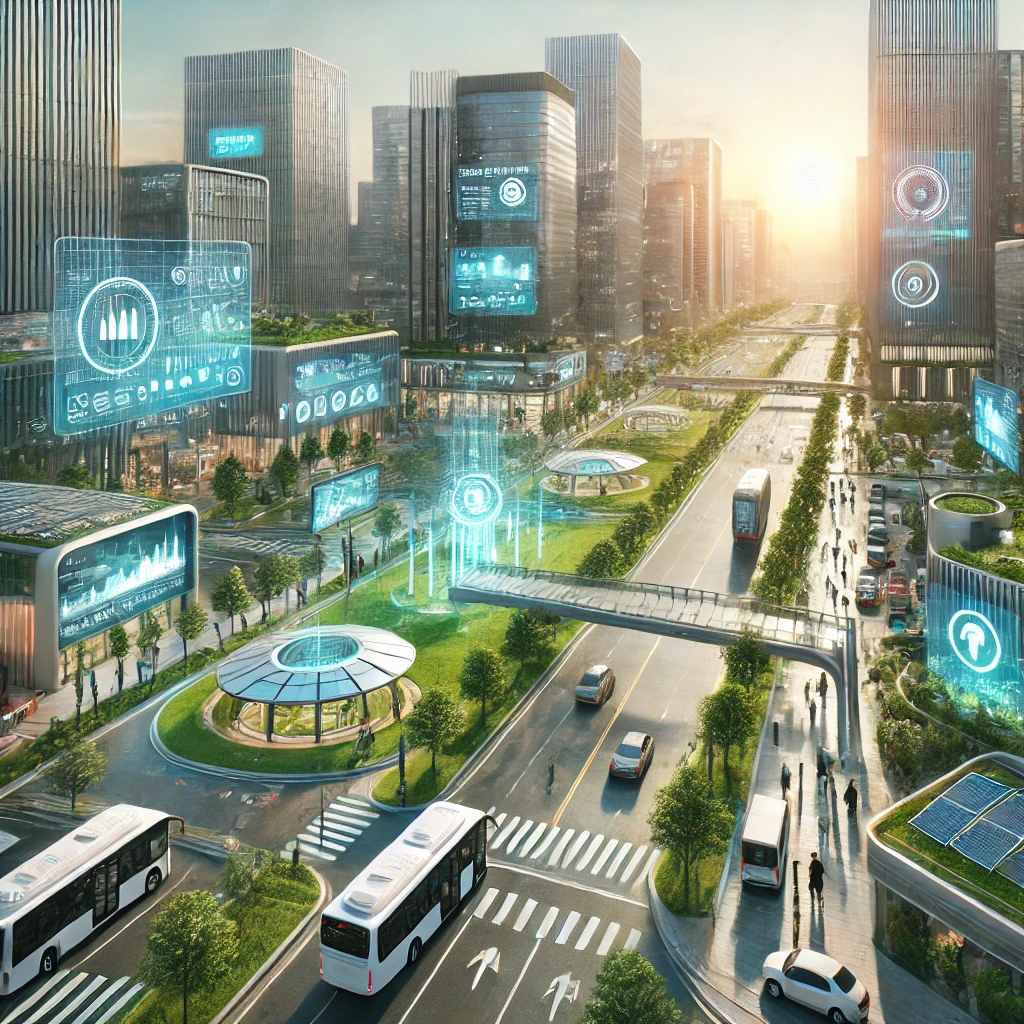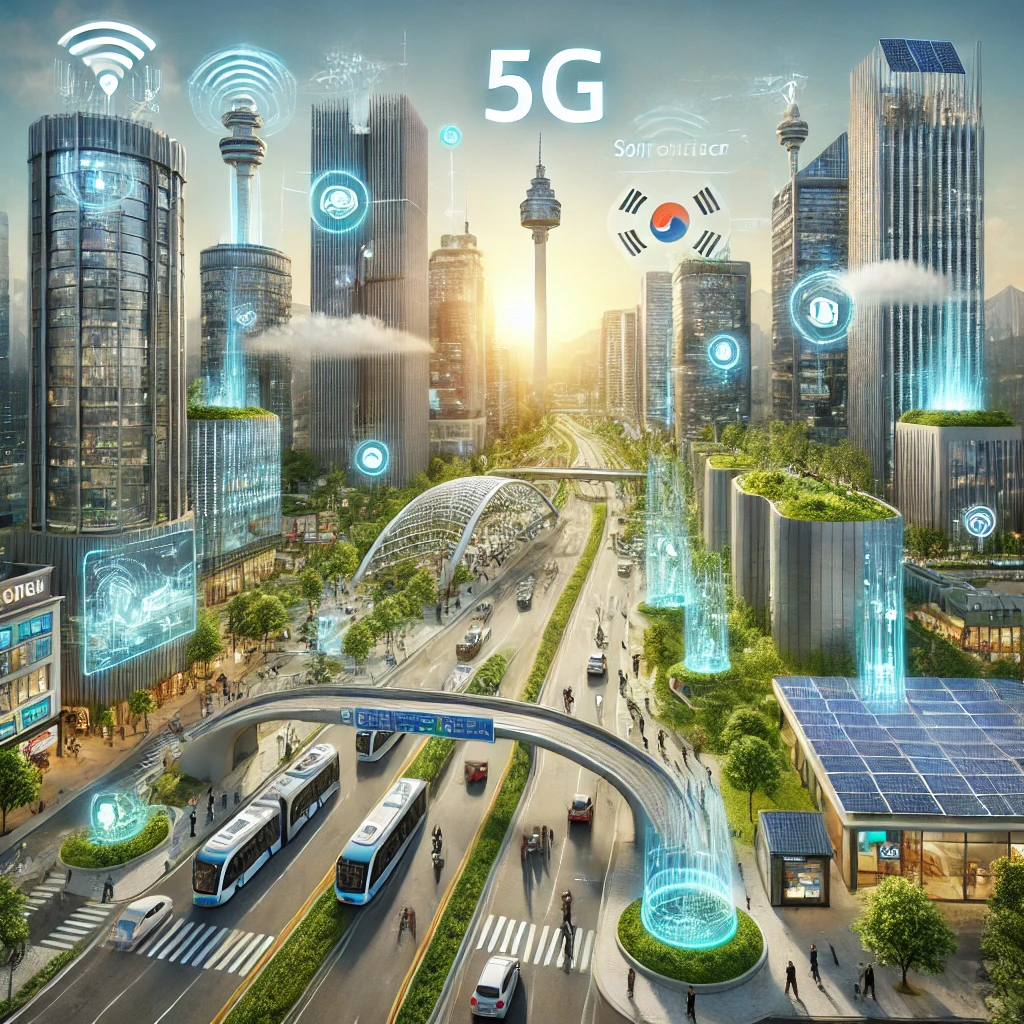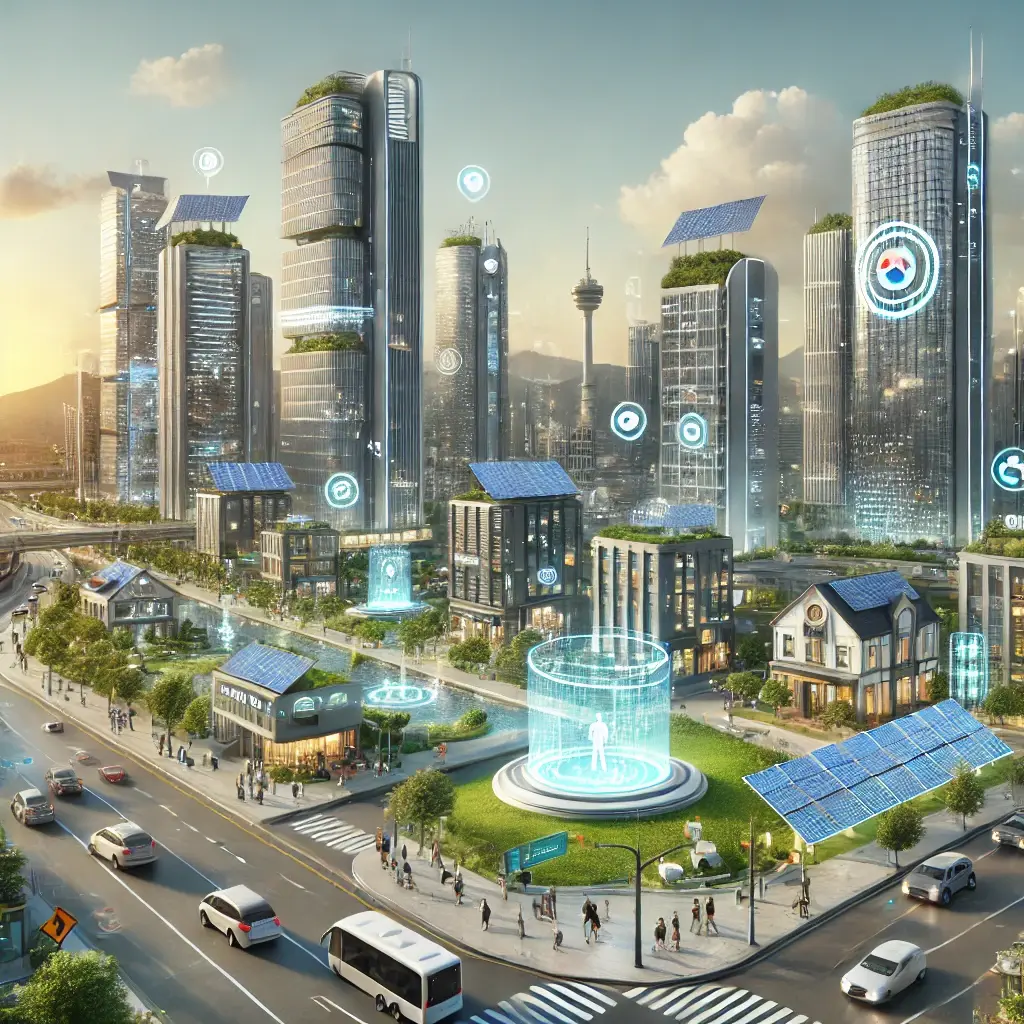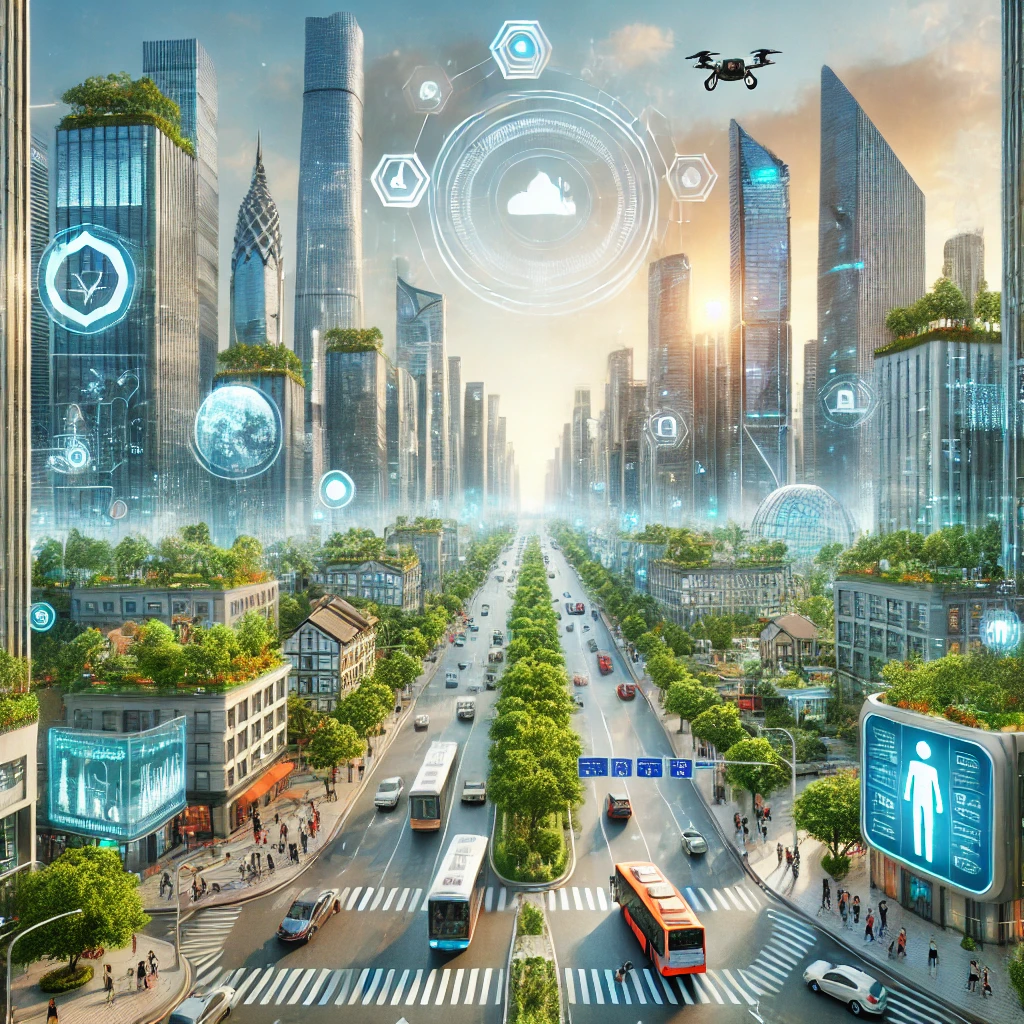Table of Contents
Introduction to Smart Cities
Smart cities represent a transformative approach to urban planning and management, characterized by the integration of technology, data, and innovative strategies to enhance the quality of life for residents. At their core, smart cities utilize digital infrastructure to collect and analyze data from various urban systems, enabling efficient decision-making and resource allocation. The significance of smart cities in the modern world is underscored by their potential to address pressing challenges related to urbanization, such as traffic congestion, environmental degradation, and public health.
One of the fundamental principles of smart cities is connectivity. By leveraging the Internet of Things (IoT), these urban areas create interconnected networks that facilitate seamless communication among infrastructure, services, and citizens. This connectivity empowers stakeholders to monitor city operations in real-time, respond promptly to issues, and engage residents in decision-making processes. Moreover, the implementation of smart technologies allows for the development of intelligent transportation systems, smart grids, and enhanced public safety measures, all contributing to a more efficient urban environment.
Sustainability is another pivotal component of smart city frameworks. Urban planners and managers are increasingly adopting eco-friendly technologies to promote energy efficiency, reduce waste, and lower carbon emissions. For instance, many smart cities are incorporating renewable energy sources and employing smart waste management systems that optimize collection routes based on real-time data. This focus on sustainability not only aids in mitigating ecological impacts but also fosters a healthier environment for inhabitants.
Additionally, citizen engagement plays a critical role in the functioning of smart cities. With the use of digital platforms, local governments can solicit feedback and involve residents in urban initiatives actively. This collaborative approach ensures that the needs and preferences of the community are taken into account, leading to more effective policy planning and implementation. As the world continues to evolve towards urbanization, the smart city model offers a promising pathway to ensure that cities remain livable, sustainable, and connected.

The Technological Backbone of Smart Cities
As urban areas evolve into smart cities, the integration of advanced technologies serves as a critical backbone for enhancing urban living. A prominent technology that plays a significant role in this transformation is the Internet of Things (IoT). By connecting a network of devices and sensors, IoT facilitates the gathering and sharing of real-time data. This connectivity allows municipalities to monitor various systems—such as traffic flow, air quality, and energy usage—leading to more efficient urban management.
Big data analytics is another crucial component of smart city infrastructures. The massive volume of data generated by IoT devices is processed and analyzed to derive actionable insights. For instance, analyzing traffic patterns can enable cities to optimize transit routes and reduce congestion. Additionally, big data supports the effective allocation of resources, as it helps in predicting demand and enhancing service delivery across public utilities.
Artificial intelligence (AI) synergistically interacts with big data and IoT to facilitate autonomous decision-making. AI algorithms can analyze trends and patterns, allowing for predictive maintenance of urban infrastructure and enhancing public safety through intelligent surveillance systems. Moreover, AI applications span various sectors, including healthcare, where smart city initiatives can lead to better disease monitoring and management through data integration.
Finally, cloud computing serves as the framework for the storage and access of the vast amounts of data generated within smart cities. Its scalability and flexibility enable local governments to adopt new technologies without significant infrastructure investments. The cloud ensures that essential applications run smoothly, allowing for real-time data processing and accessibility across different governmental departments.
Through the combined application of IoT, big data, AI, and cloud computing, smart cities are poised to create a seamless infrastructure that enhances the quality of life for their residents while promoting sustainability and efficiency.
Case Studies of Notable Smart Cities in Korea
Korea has emerged as a global leader in the development of smart cities, with several cities showcasing innovative projects and initiatives that enhance urban living. Notable examples include Songdo, Busan, and Seongnam, each representing unique approaches to integrating technology and sustainability into urban design.
Songdo, often hailed as one of the most advanced smart cities globally, was built from scratch as a pilot project for urban innovation. The city integrates cutting-edge technologies such as sensors, data analytics, and IoT (Internet of Things) to improve transportation, waste management, and energy efficiency. For instance, a pneumatic waste disposal system allows residents to dispose of waste without using garbage trucks, resulting in reduced emissions and improved air quality. This initiative not only enhances the city’s aesthetics but also sets a precedent for waste management in other urban areas.
Busan, Korea’s second-largest city, is also making strides in smart city initiatives. The city has implemented a digital transportation system, providing real-time data on public transit options and traffic conditions through a comprehensive mobile application. This innovation aims to reduce congestion and promote the use of public transport. Furthermore, Busan’s commitment to eco-friendly practices includes the establishment of smart parks that utilize renewable energy and smart lighting to enhance leisure spaces while simultaneously conserving resources.
Seongnam, on the other hand, emphasizes community engagement in its smart city development. The city employs a participatory approach, collecting input from residents about their needs and desires. This feedback influences projects like the development of smart health services and community safety systems. The integration of advanced technologies, such as artificial intelligence in public services, has improved citizen satisfaction and fostered a greater sense of trust between the community and local government.
These case studies illustrate that successful smart cities in Korea are characterized by their innovation, sustainability, and collaborative efforts with local citizens. Each city’s unique initiatives contribute valuable lessons that can guide future urban development both in Korea and around the world.
Sustainability and Environmental Impact
Korea’s smart cities are at the forefront of integrating advanced technologies with sustainable practices to tackle environmental challenges. Central to this initiative is the commitment to reducing carbon emissions and enhancing the quality of urban life. One prominent aspect is the transition to green energy sources, which significantly diminishes dependence on fossil fuels. Solar panels are being installed on rooftops and public spaces, while wind turbines augment energy production in designated areas. These renewable energy systems not only provide cleaner energy but also promote energy self-sufficiency within urban settings.
In addition to green energy, waste management is a critical component of sustainability in smart cities. Technological innovations, such as smart bins equipped with sensors, monitor waste levels and optimize collection routes. This ensures efficient operation and reduces the carbon footprint associated with waste collection. Moreover, several initiatives promote the circular economy by encouraging recycling and composting, thus minimizing landfill waste. By integrating advanced processing technologies, cities can transform waste into energy or reusable materials, further underscoring their commitment to sustainability.
Furthermore, air quality monitoring systems are essential in smart cities, utilizing Internet of Things (IoT) technology to provide real-time data regarding pollution levels. These systems enable swift responses to pollution spikes, allowing authorities to implement necessary measures to safeguard public health. Additionally, public awareness campaigns, fueled by real-time data accessibility, educate citizens about their role in maintaining air quality—highlighting the interconnectedness of individual actions and collective outcomes.
The focus on sustainability in Korea’s smart cities showcases the nation’s dedication to creating urban environments that minimize ecological footprints while enhancing residents’ quality of life. By leveraging innovative technologies, these cities are paving the way for a greener, more sustainable future.
Citizen Engagement and Community Involvement
The development of smart cities in Korea relies significantly on the active participation of residents. This engagement is essential for ensuring that urban planning practices align with the needs and aspirations of the community. A variety of community engagement platforms have been established to facilitate meaningful interactions between citizens and local governments. These platforms enable residents to voice their opinions, share experiences, and contribute ideas on various urban issues, ranging from transportation to waste management.
Feedback loops are another crucial component of citizen engagement in smart cities. By implementing systems where residents can provide ongoing feedback on city services and initiatives, local authorities can adapt and improve their strategies. For example, mobile applications and online surveys allow citizens to report issues such as potholes or inadequate street lighting, ensuring that their concerns are addressed promptly. This two-way communication not only enhances service delivery but also fosters a sense of community ownership among residents.
Participatory governance models further empower citizens in the decision-making processes related to urban development. These models enable individuals to engage in workshops, public forums, and collaborative planning sessions where they can contribute directly to policy formulation. By involving citizens in the governance process, smart cities cultivate transparency and trust between local governments and their constituents. Moreover, these models can lead to innovative solutions that reflect the unique characteristics of the community.
Ultimately, citizen engagement is pivotal for the success of smart cities in Korea. By harnessing the insights and expertise of residents, municipalities can create more inclusive, responsive, and sustainable urban environments. In turn, this not only improves the quality of life for citizens but also cultivates a vibrant and interconnected community that is essential for the long-term viability of smart city initiatives.
Challenges in Developing Smart Cities
The development of smart cities in Korea and across the globe is fraught with various challenges that need to be addressed to ensure their successful implementation. One of the primary concerns is data privacy. As smart cities rely heavily on the collection and analysis of vast amounts of personal data to enhance city services and infrastructure, safeguarding this data from breaches is paramount. Citizens often express apprehension about how their information is used and shared, making it crucial for smart city initiatives to establish robust data protection regulations.
Another significant challenge lies in technological disparities among different regions and demographics. In Korea, urban areas may be equipped with advanced technologies, whereas rural regions lag behind. This discrepancy can lead to unequal access to smart city benefits, exacerbating existing inequality issues. Therefore, it is essential to develop strategies that ensure inclusive access to the technologies and services offered in smart city frameworks.
Regulatory hurdles also pose a significant obstacle to the rapid advancement of smart cities. Governments must adapt existing legal frameworks to accommodate new technologies and innovative practices in urban development. This entails not just revising laws but also fostering collaboration between public and private sectors to create an ecosystem where innovative solutions can thrive.
Moreover, the need for long-term funding and investment in infrastructure cannot be overlooked. Developing smart city initiatives requires substantial resources and financial backing, which may be challenging to secure in an era of constrained budgets. Governments and stakeholders must prioritize long-term investment strategies that will support the ongoing evolution of smart cities, ensuring they remain sustainable and beneficial for all citizens.
The Role of Government and Policy Making
The development of smart cities in South Korea is significantly influenced by the proactive role of government policies and strategic initiatives. The South Korean government recognizes the potential of smart cities to enhance urban living through technology-driven solutions and sustainable practices. As a result, a comprehensive framework has been established to promote the growth and viability of these projects.
One of the key strategies employed by the government is the implementation of national plans and policies designed to create an integrated ecosystem for smart city initiatives. The “Smart City Master Plan,” for instance, outlines specific objectives and standards aimed at fostering innovation, sustainability, and efficiency within urban environments. This plan includes guidelines for adopting advanced technologies such as the Internet of Things (IoT), artificial intelligence (AI), and big data to improve urban infrastructure and services.
Furthermore, government funding initiatives play a crucial role in facilitating the development of smart cities. Substantial investments have been directed towards pilot projects, aimed at testing and refining smart city concepts before wider deployment. These funding mechanisms often prioritize public-private partnerships, which harness the strengths of both sectors. Collaboration between government entities and private companies fosters innovation while ensuring that projects align with public needs and interests.
The government also actively engages in creating regulatory frameworks that address the challenges posed by rapid urbanization and technological advancements. These policies often include incentives for research and development, tax benefits, and streamlined permitting processes, making it easier for businesses to participate in the smart city arena. As a result, South Korea has positioned itself as a global leader in smart city initiatives, paving the way for a future where urban living is enhanced through strategic governance and collaborative efforts.
Future Trends in Smart City Development
The concept of smart cities is rapidly evolving, driven by technological advancements and changing urban dynamics. As we look toward the future, several key trends are expected to redefine the smart city framework significantly. One of the most notable trends is the integration of artificial intelligence (AI) and machine learning, which will enhance city operations and decision-making processes. These technologies can analyze vast amounts of data, optimizing resource allocation and improving traffic management, thereby promoting sustainability and efficiency in urban environments.
Moreover, the ongoing urbanization trend leads to a shift in demographics, with more people moving to urban areas. This change necessitates the development of innovative solutions to accommodate growing populations. Smart cities will increasingly leverage IoT (Internet of Things) devices to collect real-time data on various services, ranging from waste management to transportation. This data-driven approach enables city planners to anticipate needs, improving the overall quality of life for residents.
Citizen participation is another critical factor influencing smart city developments. As urban residents become more tech-savvy, their expectations for city services are rising. In the coming years, cities will harness digital platforms and applications that encourage community engagement and feedback, allowing residents to voice their needs and preferences directly. This shift toward participatory governance will foster a collaborative environment where citizens feel empowered to contribute to the city’s development.
Lastly, considering the growing importance of sustainability, smart cities will increasingly adopt green technologies and renewable energy sources. These solutions will mitigate environmental impacts and promote resilience against climate change. Innovations such as smart grids and energy-efficient infrastructure will feature prominently in future urban planning strategies. As we move toward an interconnected urban future, these trends will play a pivotal role in shaping the smart city landscape, ensuring it remains adaptable, sustainable, and citizen-centric.
Conclusion: A Vision for Urban Living
As explored throughout this blog post, smart cities represent a transformative approach to urban living that holds significant promise for residents in Korea and around the world. The integration of advanced technologies, data analytics, and sustainable practices is set to redefine how we interact with our urban environments. By leveraging the Internet of Things (IoT) and other cutting-edge innovations, smart cities enhance not only the efficiency of city services but also improve the quality of life for their inhabitants.
The emphasis on ongoing innovation is crucial for the success of these urban settings. Continuous advancements in technology and infrastructure are essential in addressing the challenges that cities face, including population growth, environmental sustainability, and economic development. Collaboration among government bodies, private sector entities, and local communities fosters an ecosystem where ideas can flourish and where everyone has a stake in the outcome.
Moreover, community collaboration plays a vital role in shaping the smart city landscape. Engaging citizens in the decision-making process ensures that the needs and aspirations of local populations are recognized and accommodated. This participatory approach not only builds trust among stakeholders but also empowers residents to contribute to their urban environment actively. Inclusive planning processes foster a sense of ownership, reinforcing the resilience and adaptability of smart cities as they evolve over time.
In essence, the future of urban living in Korea paints a hopeful picture, where smart technologies complement sustainable practices to create vibrant, livable environments. By prioritizing innovation, collaboration, and resilience, Korean cities can emerge as global leaders in the smart city movement, setting benchmarks for others to follow. The journey towards these intelligent urban landscapes is just beginning, representing a significant opportunity to enhance the urban experience for generations to come.






